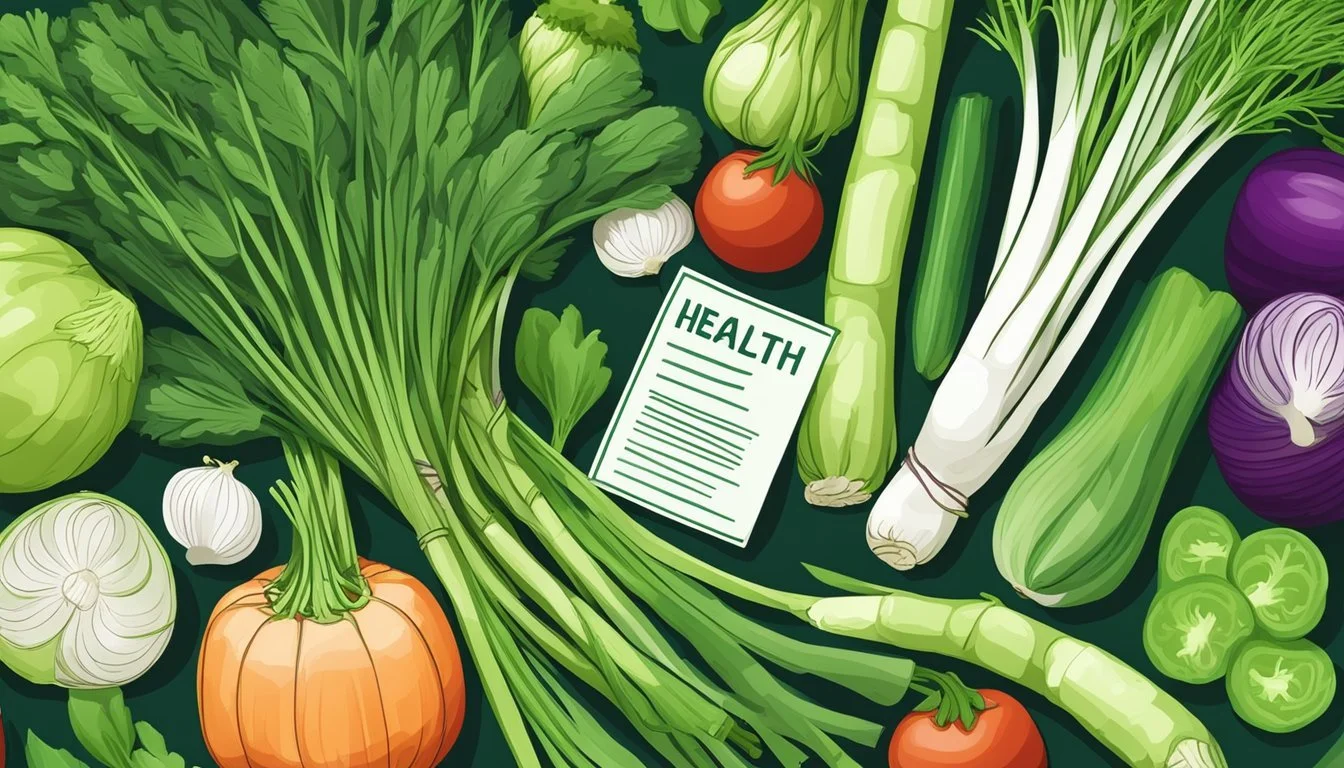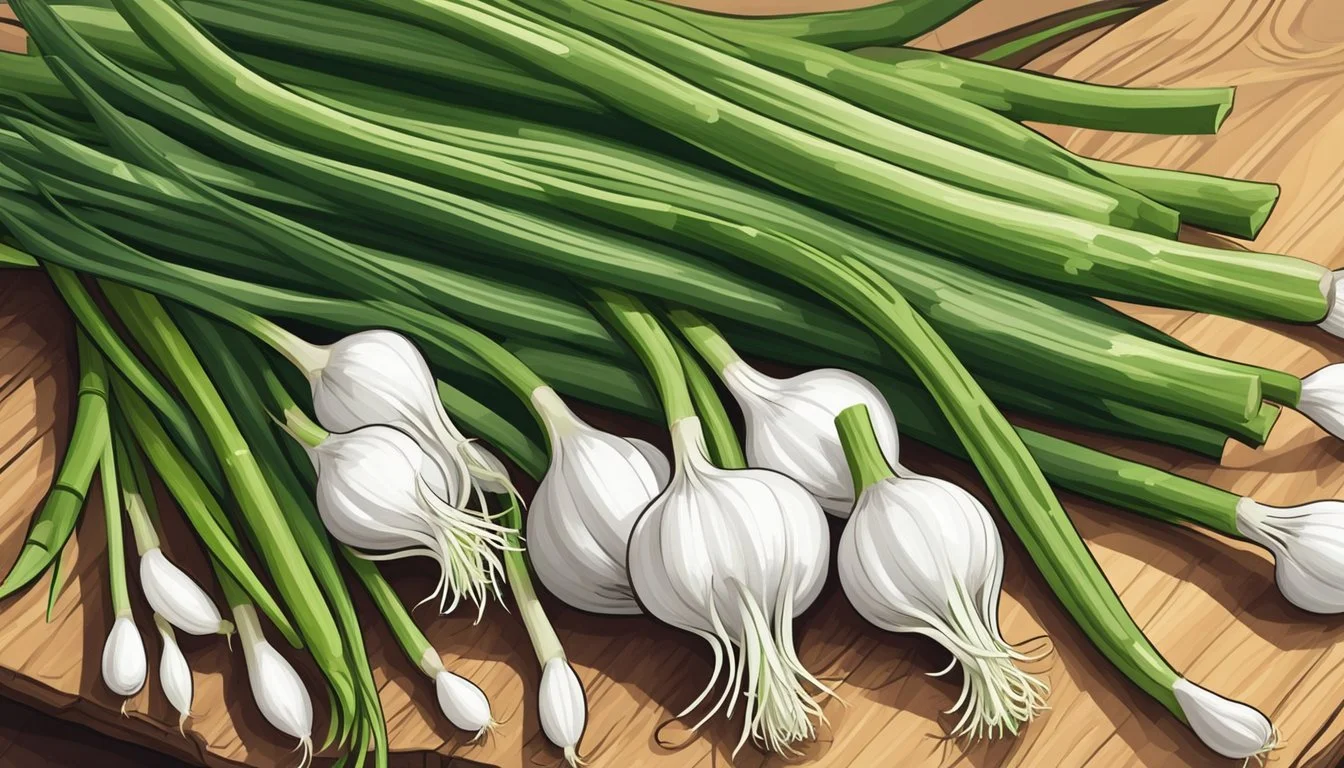What Are the Health Benefits of Scallions?
Unveiling Nutritional Advantages
Scallions, often known as green onions or spring onions, are a common ingredient in many cuisines worldwide. They contribute a unique flavor to dishes while also offering a range of health benefits. Rich in essential nutrients, scallions are a low-calorie food that includes vitamins A, C, and K as well as important minerals like calcium and potassium.
The vitamins and antioxidants in scallions serve several key functions in maintaining good health. Vitamin A supports skin cell regeneration, contributing to a radiant complexion, while vitamin C plays a crucial role in immune function and the maintenance of healthy connective tissue. Moreover, the fiber content in scallions aids in digestion and promotes satiety, which can help in cholesterol management and reduce the risk of chronic conditions such as diabetes.
In addition to fiber and vitamins, scallions offer antioxidant properties that can help reduce oxidative stress in the body, potentially mitigating inflammation and lowering the risk of various diseases. The inclusion of scallions in a regular diet may fortify the respiratory system as well, promoting lung health. With their intricate nutritional profile, scallions are not only a versatile culinary component but also a supportive ally for overall well-being.
Nutritional Profile of Scallions
Scallions, also known as green onions or spring onions, are not only versatile in culinary applications but also have a significant nutritional profile. This section examines the vitamins, minerals, and macronutrients found in these leafy greens.
Vitamins and Minerals
Scallions are abundant in several key vitamins and minerals essential for optimal health. Specifically:
Vitamin K: Crucial for blood clotting and bone health.
Vitamin A: Important for skin health and vision.
Vitamin C: Known for its antioxidant properties and immune system support.
Folate: Essential for DNA synthesis and repair.
Other minerals present in scallions include calcium, iron, potassium, magnesium, and phosphorus.
The following table lists the content of these components per 100 grams of fresh scallions.
Vitamin K: 207% of the Daily Value (DV)
Vitamin A: 20% of the DV
Vitamin C: 31% of the DV
Folate: 16 µg
Calcium: 72 mg
Iron: 1.48 mg
Potassium: 276 mg
Magnesium: 20 mg
Phosphorus: 37 mg
*Daily Value (DV) percentages are based on a 2,000 calorie diet.
Macronutrients
Scallions are low in calories, making them a light addition to any meal. In terms of macronutrients, they contain:
Calories: A low count of only 31 per 100 grams.
Fiber: Provides about 2.6 grams, aiding in digestion and satiety.
Proteins and Fats: They offer a modest amount of protein (1.83 grams) and are low in fats (0.19 grams), with an emphasis on healthy, unsaturated types.
Carbohydrates: Mostly in the form of natural sugars and fiber (7.34 grams).
The nutritional content of scallions underscores their value in a diet aiming for a balance of vitamins, minerals, and macronutrients, with an emphasis on plant-derived health benefits.
Health Benefits and Research
Scallions, also known as spring onions, are a nutritious addition to the diet, offering a unique combination of flavonoids and sulfur-containing nutrients. The health benefits of scallions range from promoting cardiovascular health to bolstering the immune system, with ongoing research supporting these potential advantages.
Cardiovascular Health
Scallions serve as a heart-healthy food. They contain valuable amounts of fiber which has been linked to lower LDL cholesterol levels. Additionally, scallions are a good source of vitamin K, essential for blood clotting processes. Studies suggest that vitamin K may help prevent calcification of the arteries, potentially reducing the risk of heart disease.
Cancer Prevention
The antioxidants and flavonoids found in scallions, including quercetin, play a role in cancer prevention. Current research highlights that these compounds may contribute to the body's ability to combat cancerous cells. The anti-inflammatory properties of scallions may also lower the risk of developing certain types of cancer.
Digestive Health
Scallions are rich in dietary fiber, supporting the digestive system by enhancing bowel regularity and contributing to a healthy gut flora. Adequate fiber intake is associated with a reduced risk of digestive disorders.
Bone Health
The vitamin K found in scallions not only supports the cardiovascular system but is also vital for bone health. It works in tandem with calcium, a mineral that scallions provide in modest amounts, to improve bone density and may reduce the risk of osteoporosis.
Immune System Support
Scallions are high in vitamin C, a powerful antioxidant that is crucial for immune system function. This vitamin helps protect the body against infections and supports immune health by stimulating the activity of white blood cells.
This concise overview illustrates how the addition of scallions to one's diet can be beneficial across various health areas, backed by ongoing research that continues to unveil the complexities of how these nutrients function together.
Culinary Uses of Scallions
Scallions, also known as green onions, are a dynamic ingredient that enhance a multitude of recipes with their distinctive flavor. They are commonly utilized as both a flavorful component and a garnish in various dishes.
Diverse Recipes
Scallions are integral to many cuisines around the globe and feature prominently in recipes from salads to pancakes. They can be eaten raw, lending a crisp, sharp taste to salads and garnishes, or cooked, which mellows their flavor, making them suitable for soups, stir-fries, and fried rice. As a versatile vegetable, scallions can also be grilled, roasted, or used as a base for sauces.
Salad: Adds a fresh bite to leafy greens or grain-based salads.
Pancakes: Mixed into batter for savory pancakes, like the Korean pajeon.
Noodles: Tossed with noodles for added freshness and zest.
Fried Rice: Provides a subtle pungent note within a complex flavor profile.
As a Flavor Enhancer
Scallions serve as a potent flavor enhancer due to their unique taste, which can complement other ingredients without overwhelming them. When used as a garnish, they add not only a pop of color but also a layer of flavor complexity. The white and green parts of the scallion can be used differently: the white often for cooking to build a flavor base and the green for its aesthetic appeal and a sharper taste when added at the end of cooking or as a garnish.
Soups: Scallions are added for a delicate onion flavor.
Stir-fries: Sliced thinly to meld with other bold flavors.
Garnish: Finely chopped to sprinkle on top of dishes for a fresh taste and visual appeal.
Considerations in Diet and Cooking
Scallions, with their low calorie count and high fiber content, offer significant benefits for weight management and can be incorporated into a diet through various preparation techniques.
Weight Management
Scallions are a beneficial food for individuals looking to manage their weight due to their low-calorie nature. One cup of chopped scallions contains approximately 32 calories, making them a minimal addition to the daily calorie intake. Moreover, the dietary fiber in scallions, approximately 2.8 grams per cup, aids in satiety, thereby reducing the overall food consumption. This fiber content also supports digestive health, which is crucial in maintaining a healthy weight.
Preparation Techniques
When preparing scallions, individuals have a range of techniques at their disposal. They can be eaten raw, offering a crisp texture and a fresh flavor, usually added to salads or as garnishes on various dishes. Alternatively, scallions can be cooked – grilled scallions, for instance, are a popular choice, enhancing the natural sweetness of the vegetable without adding significant fat or calories.
Storage is another consideration; fresh scallions should be stored in a loose plastic bag in the crisper drawer of the refrigerator to maintain their crispness and prevent excess moisture, which can lead to spoilage.
For those with an allergy to onions or a related sensitivity, it should be noted that scallions belong to the Allium family and may cause similar reactions. However, scallions are generally low in sugar, fat, and sodium, posing minimal risks to health when incorporated into a balanced diet.
Frequently Asked Questions
Scallions, also known as green onions, provide a range of health benefits, from aiding digestion due to their fiber content to supporting skin health with vitamin A.
What nutritional advantages do scallions offer?
Scallions are a low-calorie food that comes packed with essential nutrients. They contain dietary fiber, which is important for digestive health, and they are also a good source of vitamin C, which supports the immune system.
How do scallions impact skin health?
The vitamin A present in scallions is vital for skin cell regeneration. Regular consumption can contribute to a radiant and youthful complexion due to vitamin A's role in developing and repairing skin tissues.
In what ways can scallions contribute to men's health?
Scallions contain antioxidants that may benefit men's health by supporting cardiovascular health and potentially reducing the risk of various chronic diseases. Their nutrient profile can also enhance overall vitality.
Can including scallions in one's diet aid in weight management?
Yes, scallions can be a beneficial addition to a weight management diet. Their fiber content can increase the feeling of fullness, which helps control appetite and potentially reduces overall calorie intake.
What are the potential benefits of scallions for hair care?
While direct benefits of scallions for hair care are not widely documented, their nutritional content, particularly vitamins A and C, are important for maintaining healthy hair through supporting tissue repair and collagen production.
What are the differences between health benefits of raw and cooked scallions?
Cooking can affect the nutrient profile of scallions. While raw scallions provide robust amounts of vitamin C, which is sensitive to heat, cooking can enhance some nutrients' bioavailability, such as carotenoids. However, both raw and cooked scallions maintain their beneficial dietary fiber.



